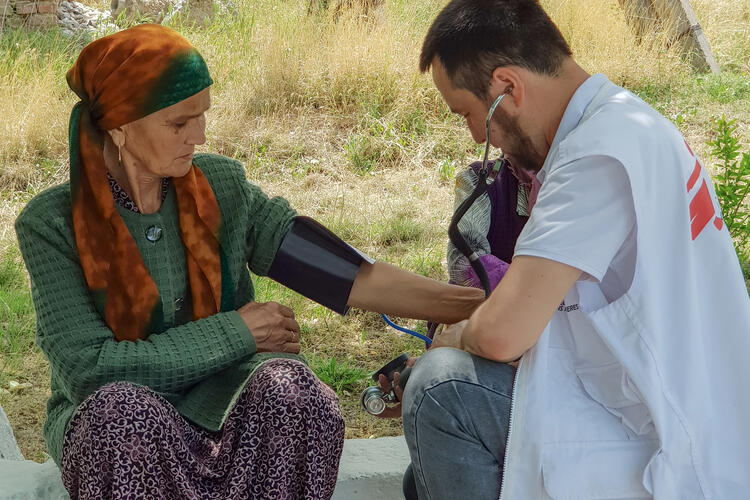Kyrgyzstan: Border clashes leave thousands homeless and in shock
Around 30,000 people in Kyrgyzstan’s Batken and Leilek districts have been forced to abandon their villages after violent clashes took place between Kyrgyz and Tajik armed forces in late April.
On a visit to the border area of Batken, a Médecins Sans Frontières / Doctors Without Borders (MSF) team saw houses, schools and clinics burned to the ground.
On the Kyrgyz side, many of the displaced people were evacuated to Batken city, where they sought shelter in schools, mosques and hotels. Others, especially from the adjoining Leilek district, sheltered with host families.
Some people have now returned to their villages but the majority are still displaced.
An MSF mobile medical team deployed to Batken city found many of the displaced people in a state of shock after the destruction of their homes and businesses.
Mental healthcare in Batken
The team is providing them with basic healthcare, while three MSF psychologists specialising in mental trauma are providing individual counselling sessions.
In the two weeks until 7 May, the MSF team in Batken city provided 363 consultations and 103 counselling sessions.
“Our work is aimed at preventing stress disorders among the displaced people,” says MSF psychologist Zhazgul Atagulova.
“Most people show signs of distress, anxiety or acute stress reactions, while some have symptoms of chronic distress and depression as border clashes and tensions are frequent in this region.”
Mobile medical care in Leilek
As well as working in Batken city, MSF also plans to provide medical care in rural areas of Leilek district, with a focus on the villages around Kolundu and Samarkandek hospitals, where the health infrastructure will struggle to cope with an increased demand for services.
In the coming days, MSF will deploy 18 medical staff, including doctors, psychologists and health promotion experts to the region.

Help us prepare for the next emergency
“Many people are traumatised and in shock,” says Kevin Coppock, MSF country director in Kyrgyzstan.
“Both Batken and Leilek districts have seen significant damage. We are supporting health authorities in providing basic health services and psychosocial care to families affected by the conflict.”
MSF teams in Tajikistan have been following the developments closely and are in contact with the authorities ready to provide assistance in case of need.
MSF in Kyrgyzstan
Kyrgyzstan is a landlocked country located in Central Asia, on the ancient Silk Road route between China and Europe. It became independent in 1991 with the collapse of the Soviet Union.
Kyrgyzstan has some of the world’s highest rates of multidrug-resistant tuberculosis. But with an inadequate healthcare system and frequent shortages, patients struggle to access free treatment.
Médecins Sans Frontières/Doctors Without Borders (MSF) started working in Kyrgyzstan in 2005 and is currently exploring innovative ways to support TB patients, bringing care closer to their homes to reduce or eliminate the time they spend in hospital.
In 2019, we concluded our TB activities in Kyrgyzstan. The seven-year project had successfully supported the Ministry of Health to improve quality and accessibility of care.
